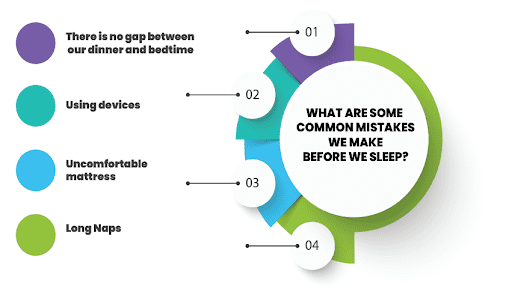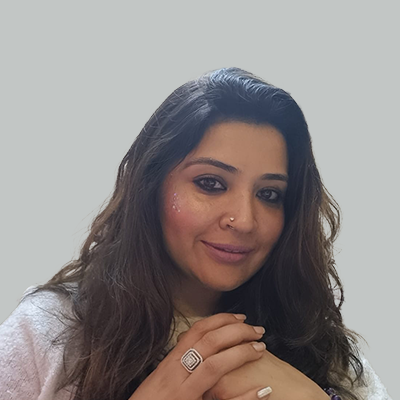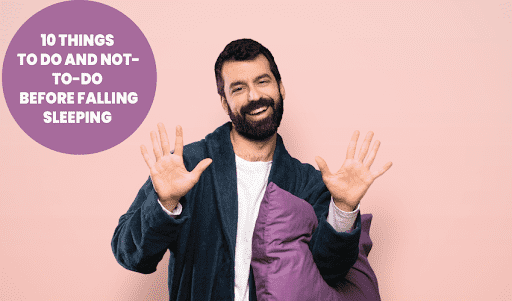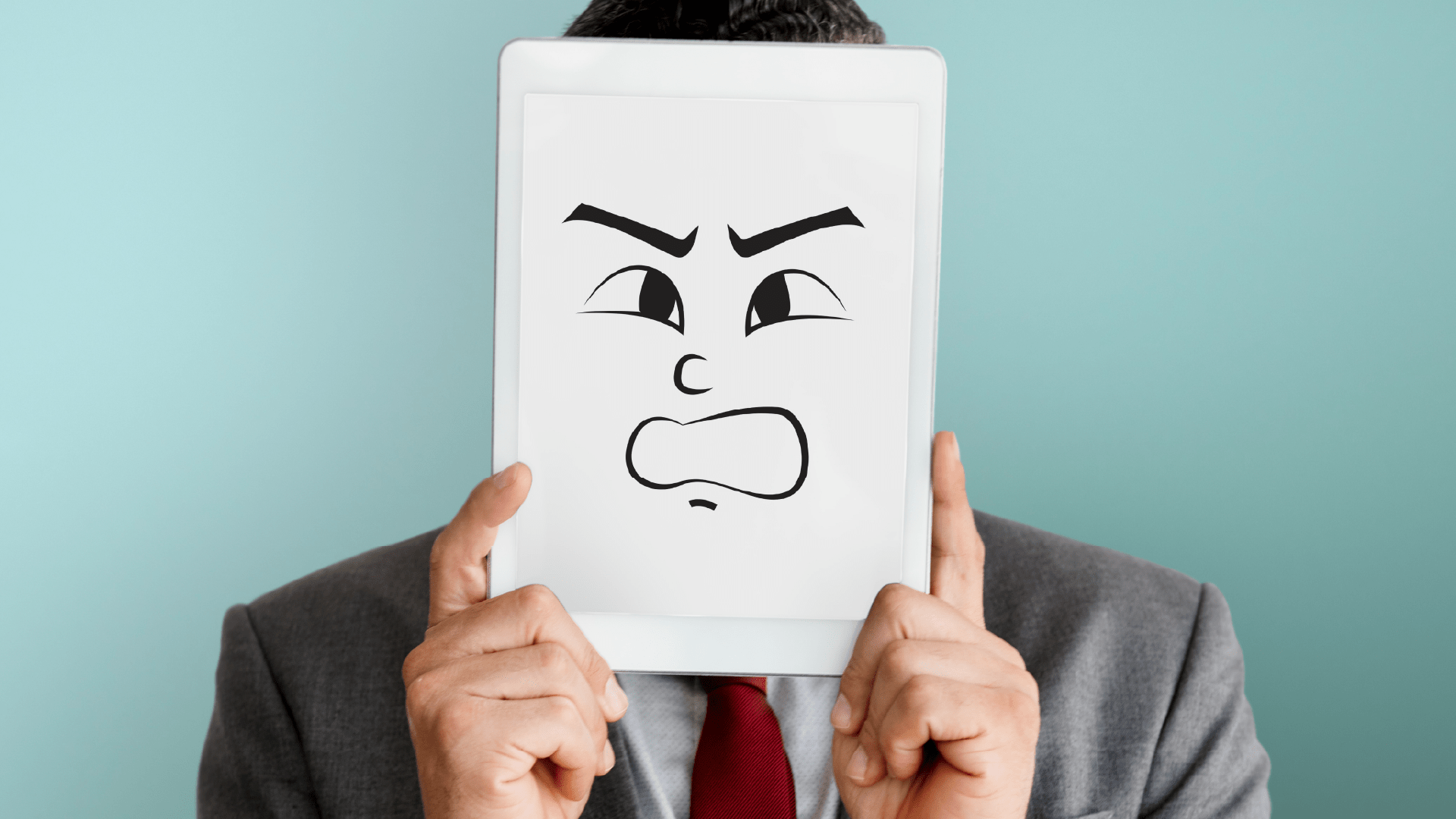Introduction
Do you stay awake until late at night because you just can’t get some sleep? Chances are, you may have insomnia. Insomnia makes it difficult to work or focus, reducing our attention span.
Read on to learn about the common mistakes before sleeping that may contribute to this condition.
Our Wellness Programs
What is Insomnia?
Insomnia is a condition wherein a person cannot sleep. It’s the inability to rest and get adequate hours of sleep required for the normal functioning of the human body. An insomnia person feels irritated, is exhausted, and frequently faces difficulty concentrating. They may also experience stress, anxiety, and restlessness. One may wake up feeling very tired and not rested even after getting some sleep. Fighting insomnia involves taking sleeping pills, therapy, and lifestyle modifications.

Looking for services related to this subject? Get in touch with these experts today!!
Experts

Neelam Parwani

India
Life Coach
Experience: 5 years

Sapna Zarwal

India
Psychologist
Experience: 19 years

Deepti Gandhi

India
Life Coach
Experience: 6 years

Zabby Sharma

India
Life Coach
Experience: 11 years

Ritu Singh

India
Life Coach
Experience: 16 years

Vasudha Agarwal

India
Psychologist
Experience: 13 years
What are some common mistakes we make before we sleep?
1. There is no gap between our dinner and bedtime.
Eating a big dinner right before sleep can cause indigestion, heartburn, and discomfort while sleeping. Space the meals well and go to bed at least 2 hours after eating dinner.
2. Our sleeping place is not ambient.
Another mistake that often leads to poor sleep routines is an environment not conducive to sleep. Your bedroom may receive too much light, and there may be disturbances. You must go to a completely dark room, switch off your blinds, turn off all the sound-causing instruments or devices, set the room temperature to ambient, which is comfortable to sleep in, and ensure that all your devices are on mute so that you can go to sleep with ease.
3. Using devices
Another mistake that most people make is using devices when lying in bed. These include scrolling their social media feeds or watching something online. The blue light emitted from the device can keep you awake for long hours. Instead, pick a book or listen to calming music instead of continuously watching your screen.
4. We do not have a sleep routine.
Not having a proper sleep routine can be detrimental to your health. It disturbs melatonin secretion, an essential hormone for causing and inducing sleep. Your schedule must remain fixed, and you do not stay awake long past bedtime.
5. Uncomfortable clothes
Often, wearing uncomfortable clothes, which are not breathable, can cause sleep disruption. Choose organic cotton and lightweight fabric, which are easy on the skin and allow you to sleep in peace.
6. Uncomfortable mattress
An uncomfortable mattress that hurts your back and causes you to toss and turn in bed frequently is another reason you are not falling asleep.
7. Going to bed with lots of thoughts
When you go to bed and keep thinking about what happened throughout the day and other things, you stress yourself out and get caught in a never-ending loop of overthinking. It eventually affects your sleep cycle.
8. Long naps
Taking frequent and very long naps during the afternoon is another reason you cannot fall asleep on time.
9. Stimulants
Consuming stimulants loaded with caffeine, such as tea, coffee, and carbonated drinks, before bedtime can give you a high and increase alertness or awareness, which then causes your sleep cycle to be disturbed.
10. Catching up on sleep debt on weekend
People sleep less during the weekdays because of excessive stress, high workload, and other priorities. They try to catch up on sleep during the weekend. It can cause high distress and disrupt your sleep cycle.
What are the alternatives to sleeping pill dependence[1]?
1. Balanced diet
A diet rich in complex carbs, high-quality protein, and an abundance of antioxidants – minerals, vitamins, etc. – can be one way of improving sleep quality. Consuming foods which promote melatonin secretion, essential for sleep, is necessary. Overall, these foods and a diet with a minimum of processed foods can help.
2. Reducing the sleeping pill dosage
Working with your doctor to gradually lower the dosages is another way of reducing sleeping pill dependence. It cannot happen overnight, and you need to constantly improve your lifestyle, work on your mental health, improve your stress levels, take a holistic approach, and then gradually work with your doctor to reduce your dosage.
3. Exercise
Exercise can help in giving your brain that endorphin rush. Exercising throughout the day can make you tired and your muscles sore. It can get you a whole night’s sleep.
4. Therapy meditation
If you feel distressed because of anxiety, high stress, depression, etc., therapy can help identify your negative thoughts and navigate them.
5. Meditation
Meditation is a good process to keep our minds calm and maintain inner peace. Hence if you practice meditation before sleeping regularly it can make good sleep hygiene.
How to use alternatives to sleeping pill dependence to overcome common mistakes we make before we sleep
To rectify these mistakes, you must go to bed after spacing your meals, stay away from devices at least an hour before bedtime, de-stress, and create an ambient room temperature conducive to sleep. A good sleep hygiene routine, a healthy lifestyle, and thought patterns can make you happier and more productive. Prioritise your health and make wiser decisions today.
What are the effects of the alternatives to sleeping pill dependence?
- You may not wake up feeling groggy and tired.
- You may also holistically feel better and relaxed without consuming sleeping pills[2].
- It will also become easier to manage stress, and you will see other positive outcomes in your life.
- These include better social interaction, better relationship management, and success in personal and professional life. These will also boost your physical, mental, and emotional health.
Conclusion
Insomnia[3] is a sleep disorder. It has some characteristics. They are the inability to fall asleep and get good hours of sleep, qualitatively and quantitatively. Working on insomnia through a holistic approach is essential. It will help in gradually reducing your dependence on sleep medication. Lifestyle modifications, therapy, a balanced diet, and changing your sleep environment can help reduce your dependence.
If you want any help, the trained mental health professionals at United We Care are happy to assist you!
| [1] | T. J. Coates and C. E. Thoresen, “What to use instead of sleeping pills,” JAMA, vol. 240, no. 21, pp. 2311–2312, 1978. |
| [2] | F. Solomon, C. C. White, D. L. Parron, and W. B. Mendelson, “Sleeping pills, insomnia and medical practice,” N. Engl. J. Med., vol. 300, no. 14, pp. 803–808, 1979. |
| [3] | Jstor.org. [Online]. Available: https://www.jstor.org/stable/3405423#metadata_info_tab_contents. [Accessed: 29-Aug-2022]. |












